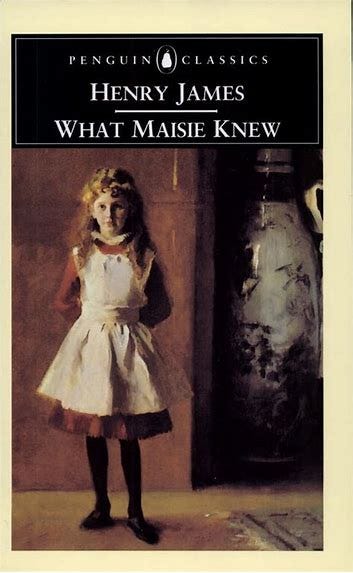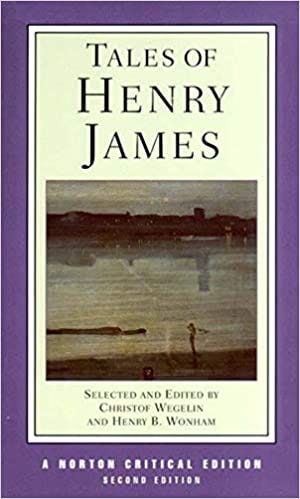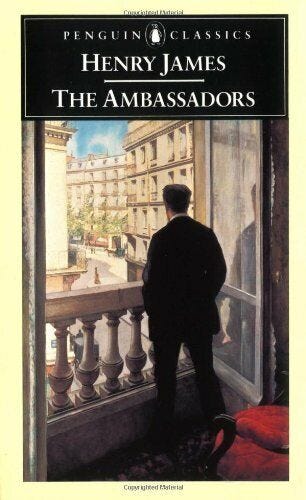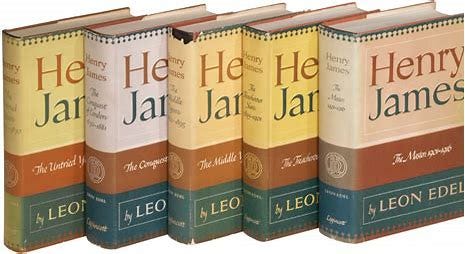Why you should read Henry James
Plus a new Interintellect salon on the author
Henry James is my favourite writer. Not, I’m saying, the best writer, but my most treasured, a novelist whose work has meant a great deal to me and provided solace and companionship throughout my adult life.
To that end, I’m holding an Interintellect salon on James next Thursday, December 21st at 19.00 GMT. Tickets are available here. If you’re a paid subscriber, let me know if you want to come and I’ll sort you a free code.
Ahead of this, and with permission from paying subscribers, I’m reupping the introduction to James I published in February. I’ve also added a new paragraph in the ‘Deep Cuts’ on the latest James novel I read, ‘The Tragic Muse’.
Happy Jamesing - and I hope it inspires some of you to come to the salon.
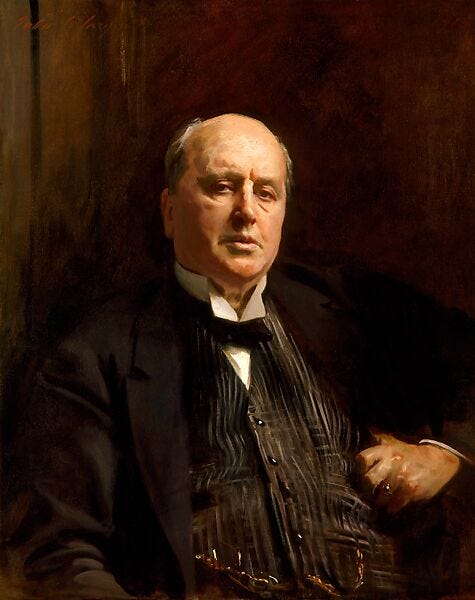
“We work in the dark - we do what we can - we give what we have. Our doubt is our passion, and our passion is our task. The rest is the madness of art.” – The Middle Years (1893)
I will start this piece with a bold claim, which will hopefully inspire you to read a little further – setting this in the context that my newsletter posts about artistic matters always hugely underperform the rest, for the simple reason that the reader feels they should already know the artist in question – namely that I believe that Henry James is the best novelist in the English language.
Of course, I haven’t read all of his novels, a feat beyond most people in gainful employment, so I should say that he is rather the best that I have yet encountered, and, given that I am a lifelong and committed reader, there’s been a fair old bit of encountering going on.
Yet James’ oeuvre is vast, and to add to that he has a reputation as being something of a difficult writer – which in practice means that he’s a stylist, and that his style requires a certain habituating to. Said style involves long, discriminatory sentences, and these get notably longer and more discriminatory as James proceeds, he begins to discriminate in his discriminations; the indulgence of minute social analysis, and the use of items of vocabulary of a somewhat recherché nature. Do you know what prestidigitation is? Henry James does.
And of course, James is very much engaged with European high culture, meaning there countless references to French culture and the French language, and to a lesser extent to Italian, adorn his texts. However, as I have been known to point, being learned is not the same as being pretentious. Indeed it’s the opposite – pretension is showing off about things you don’t know about, rather than those you’ve taken pains to master.
The fact is, with such a big body of work, you can easily be put off James just by reading his books in the wrong order. That’s exactly what happened to me, reading one of his more difficult novels first, namely ‘The Awkward Age’ (1899), a dialogue-heavy and experimental novel I absolutely don’t recommend starting with.
Yet something kept me going to acquire the acquired taste, allowing the context of my being an English undergraduate then, which is probably the ideal condition to seriously read Henry James. Adult life – unless you’re an artsy refusenik like myself – rarely affords us the opportunity, in all its complications of family and paid labour, for literary leisure. These are adult responsibilities which James, both independently wealthy and a ‘confirmed bachelor’, did not have to enter into.
It’s my view that this slightly leisured quality of James’ writing means he offers us something we all desperately need in our lives, a kind of stimulating respite. An upmarket intellectual entertainment, but one where the ‘challenge’ of the work is not fetishized. He’s a kind writer, who does not categorically judge anyone who crosses his literary consciousness, and is instead intrigued to simply hold them up to the light and in Joseph Conrad’s words deal in the ‘deep shadows and sunny places.’
In our hectic, over-caffeinated times of anxiety and dystopian fetishization James offers some of us a kind of literary soul food. If nuance is out of fashion, as people love to say, well, Henry James does the nuance of nuance.
And of course, when you do connect with his style, he’s addictive as hell; though his cast of characters is broad, there is also a sense of James subtly rotating elements in and out of the work, allowing us to read him with the thrill of the completist, in the way we read the great writers of detective fiction to enjoy each and every minor variation of their stock elements.
So, I hope I’ve made a good opening pitch for reading him. Which begs the question:
Where to start with Henry James?
WHERE TO START
“Cats and monkeys - monkeys and cats - all human life is there!” – ‘The Madonna of the Future’ (1873)
James’ most famous two works are ‘The Turn of the Screw’ and ‘Portrait of a Lady’, and I’ve read neither.
What, I hear you cry, you’re writing a guide to Henry James and you haven’t even read his two most famous works?
In my defence, I think James himself would be dryly amused by this – as well as delighted by having a mass readership of any stripe, a thing he coveted failed to achieve in his life; he once joked to Edith Wharton, after she told him that she’d paid for a car out of her book royalties, that his would just about cover a wheelbarrow. Anyway, the reason I haven’t read these two stories is simply that as I made my way through his work those books never seemed the logical next two to read.
However, there is probably a tier of James’ works, which count as ‘pretty famous and also accessible’. There’s often been films of these – it’s a bit of a myth that there are no good films of Henry James, the films which get made just aren’t particularly Jamesian. In this category I’d put ‘Daisy Miller’, ‘Washington Square’, ‘The Europeans’, and ‘The Aspern Papers’; all novellas, I think any of these works are a good place to start.
Of these, I put ‘The Europeans’ as slightly less fascinating, like an almost parodically Jamesian James, but it is one which makes an argument for another one of my ideas about James, namely that he’s a spiritual father of the rom-com.
They also deal with some of James’ signature themes – and my goodness does James have signature themes – such as, chiefly, the contrast of New World innocence and exuberance with Old World cynicism and sophistication, as well as the manipulation of innocence by experience as a moral evil.
James was also someone who lived in an age which saw the increasing development of a professionalized literary culture – JB Pinker, considered the first literary agent, represented James - and his ‘The Aspern Papers’ satirizes the increasing desire to ‘know’ the biographical particularities of an author; James showed what he thought of that by burning a vast tranche of his own letters and manuscripts.
All of this introductory three are relatively short, and written in a relatively accessible style, still full of James’ habitual perspicacity and also a kind of gentle gaiety. He was relatively young when he wrote all of them.
WHERE NEXT
What is character but the determination of incident? What is incident but the illustration of character? What is a picture or a novel that is not of character? What else do we seek in it and find in it? It is an incident for a woman to stand up with her hand resting on a table and look out at you in a certain way ; or, if it be not an incident, I think it will be hard to say what it is. - from ‘The Art of Fiction’ (1884)
Hopefully you’ve enjoyed your first little taste of James.
But it’s been very much an appetizer – beautiful writing, lovely characters, but perhaps not life-changing in its impact, except on the level of deep aesthetic pleasure, which is of course quite enough reason to read any author.
Perhaps it’s time to read something a little knottier.
Here I’ll recommend a specific novel – his 1897 masterpiece ‘What Maisie Knew’. This is one of the first novels to thematize divorce in English, and is told entirely and brilliantly from the perspective of Maisie, a seven-year old girl. The reason I recommend it so is because it’s relatively short, but still has crazy-good levels of technique and subtlety; it’s James putting his technique to a very clear end, making it a great introduction to the more complex end of things.
It was also made into a fairly decent film in 2012 though again, not a very Jamesian one; Steve Coogan is in it.
MORE!
“It takes a great deal of history to produce a little literature.” - ‘The Europeans’ (1878)
You’ve read a bit now, and you’re probably relatively aware whether James is for you or not; I’d argue you could might give him one more shot, perhaps one of his stories, just to be sure, though to be clear I wouldn’t blame you for bailing now. You might well come back anyway – I did. James is a slow-burn kind of writer; while you get on with your life, he is at work in your mind.
For the rest of you, I’d now recommend turning to a specific volume, namely this beautiful Norton Classics volume, ‘Tales of Henry James’.
It has a lovely lilac cover, the font (Electra, I believe) is very nice, and in it you can find a good range of James’ finest tales from across his career. The novelle or short novel was a form James excelled in, perhaps even perfected, and in here you can find some of his greatest works; ‘The Pupil’, ‘The Middle Years’, ‘The Beast in the Jungle’.
A particular focus is the contrast of the examined life against the life of activity, via activa against via contempliva. The volume contains also, in my experience thus far, James’ very finest piece, the short novel ‘In the Cage’, the tale of a young woman working in a telegram booth in London, which shows his ability to turn the most minimal of ingredients, and the most minimal variations upon those ingredients, into thrilling writing. If ‘In the Cage’ isn’t enough to convince you of the genius of The Master I suspect nothing will be.
And let’s say you are convinced, and wish to continue; you are probably now at the status of ‘Henry James’. Which means you’re ready for James’ late period – in the old joke dubbed as the ‘Old Pretender’ period – where James is at his most Jamesian and where he, coincidentally, helps to inaugurate the psychological novel in English.
There are three major long novels in this period; ‘The Ambassadors’, ‘The Wings of the Dove’ and ‘The Golden Bowl’, in order of their appearance. I can’t tell you much about ‘The Wings of the Dove’ as I’ve never read it, though I did see a perfectly good film of it a while back, directed by Ian Softley who also did ‘Backbeat’, ‘90s movies fans. It’s considered one of the very best James films but again - there’s something pointless about adapting a novelist whose strengths were so relentlessly interior.
‘The Ambassadors’ I would recommend wholeheartedly; let alone amongst the best of James’ novels, it’s one of the best novels in English. The book is about Lambert Strether, who is sent on reconnaissance to get the young Chad Newsome – great, brilliantly American names – back from Paris to the US and on the straight and narrow. Chad’s developed a passion for an older French divorcée, you see, and Lambert falls into the habit of romanticizing their relationship. There’s a set piece where Lambert loses, after seeing the two of them in a clinch on a boat, his idealized view of the couple which ranks as good as anything I’ve read.
What the book is really about is the life not taken – about not missing your opportunity to live, about making the most of youth, about regret and second changes in maturity. At university I read its most famous passage, and it has stuck with me ever sense as some kind of words to live by. It still does.
“All the same don’t forget that you’re young—blessedly young; be glad of it on the contrary and live up to it. Live all you can; it’s a mistake not to. It doesn’t so much matter what you do in particular, so long as you have your life. If you haven’t had that what have you had?”
- ‘The Ambassadors’, 1903
James, by the way, agreed with me, calling it ‘quite the best, “all round”, of all my productions’ – his critical eye acute enough to even extend to his own works.
I’d read ‘The Golden Bowl’ next, because that book is ‘late Henry James but more so’. The title, by the way, comes from Ecclesiastes 12:6: ‘The golden bowl is broken.’ It’s a story of four characters and the marriages and affairs between them them; each of the four central characters, Maggie, Amerigo, Charlotte and Adam, are indelible.
James’ late style reaches its apex here; long, discriminatory sentences, a deep voyage into the inner life of its character, and minimal description of their environments. And by now the Master’s work has also begun to assume a symbolic quality which almost anticipates the American postmodern. Whatever the case, although ‘The Golden Bowl’ is a masterpiece, it’s heady stuff, and in the critical concept very ‘late’ style, understood as ‘becoming more completely yourself’. James seemed to see that there was no further to go with it, and completed no further long novels, though he did abandon two, ‘The Ivory Tower’ and ‘The Sense of The Past’.
You’ll have to ask someone else about those.
JAMESIAN DEEP CUTS
“I’m glad you like adverbs - I adore them adore them; they are the only qualifications I really much respect.”
― Letter to Miss M. Betham Edwards, 5 January 1912
If you still want to read James after all this, welcome to the super-fan tier.
The good news is there’s still tons of James left to read – but, with your now strong sense of his core interests and approaches as a writer, there’s a number of different routes you could go from here. There is, in the Jamesian spirit, no need to rush. Why not read someone else for a while? Marilynne Robinson is very good.
Sadly, though, if you’ve acquired a taste for James a lot of other novelists start to seem a bit thin. What to do?
You could go then back and read his amusing satire of the country house novel, ‘The Spoils of Poynton’ (this incidentally the first novel which got me into James). You could read his criticism in ‘The Art of Fiction’, or his plays, including his notorious flop ‘Guy Domville’ though, speaking from experience, I wouldn’t bother. You could read his memoir of youth (‘A Small Boy and Others’) or memoir of American life (‘The American Scene’); you could even read the diary of his sister, Alice James, which for me provides a wonderful biographical insight into both the James family and James’ times, and certainly is a bit less circuitous in its prose than old Henry. At times it’s even punchy.
I recently read James’s late 1880s novel ‘The Tragic Muse’, a story of dedications to artistic vocations mirrored in two characters, the MP turned painter and Nick Dorner and the brilliant and intense actor Miriam Rooth. It’s a brisk enough read but, with its sprawling, almost all-English cast, it does slightly suggest into why James was better suited to chamber dramas and international scenes. An honourable mention must go though to the novel’s minor character of Madame Carré, a wonderfully acerbic and demeaning acting coach who tutors the raw Miriam. I was particularly amused by Carré’s response on being told Miriam knows four languages: "That's three too many. The thing's to do something proper with one." (Book II, Chapter VII). Unusually for James, the depiction of Miriam and her family background has light hints of antisemitism, describing her father as “only a Jew stockbroker in the city.”
Still, this verdict gives you an idea as to how deep you have to get into James to get to something non-essential. To that end, you could check out probably the writer’s weirdest novel, ‘The Sacred Fount’, which embroiders a complex theory of social relations; basically the idea if a dull person and a witty person are together, their personalities will swap roles. It’s less interesting than it sounds, and more notable for a kind of metafictional denouement when a Henry James-like figure shows up and is reprimanded for their own obtuseness.
Personally though I would do what I did and return some time later to another James’ masterpieces, 1882’s ‘The Bostonians’. The only reason I haven’t mentioned it until now is that, while it’s definitely top-tier James, it’s also quite atypical; decidedly socially minded, with observations rooted in its time and a sense of wider political issues, as well as the familiar James tropes of idealistic Americans, quietist sacrifice, and blithely insensitive men. Again, there are few writers who create as different an impression on you dependent on the order you read their works in; if you read ‘The Bostonians’ you’d think of James as a political writer, which he swore off after that novel’s failure.
A FEW FINAL OBSERVATIONS
‘Three things in human life are important. The first is to be kind. The second is to be kind. And the third is to be kind’ - Henry James as overhead by his nephew Billy James, quoted in the final of Leon Edel’s biography
There is also the question of James’ biography, where Leon Edel’s five-volume biography is legendary.
Personally I can think of few artists it’s less essential to read a biography of; James clearly sublimated his life into his work, and indeed the choice to do so is one of his deepest themes (see, for example, ‘The Lesson of the Master’). I suppose there’s the remarkable interest always occasioned by an unremarkable life, but, to be very un-Jamesian about it, YMMV on that one.
As for James’ sexuality, it’s up there as a question of literary boringness with ‘Did Shakespeare write Shakespeare?’ James was probably gay. Who cares – this a man who wrote ‘The Ambassadors’. His sexuality would have undoubtedly played out differently in public in our era, but he was a man of his.
There is one criticism of James which I do think is worth addressing in advance, namely that his style avoids getting down to the point; this might be called the Cormac McCarthy critique of James, that this is all minute analysis of the emotional states of the moneyed and privileged. This criticism comprehensively misses the point of James.
James is emotionally brutal – his affect, his legerdemain if you will, is to lull you into a position where you suddenly realize the character’s absolute worst nightmares have manifested themselves. All that style in technique is often at the service of manoeuvring us into a position where truths of the utmost severity can be uttered – and we feel that more when the characters have been made painfully real, almost like friends, to us by the author.
Finally, if James is so good, why isn’t he more widely read?
Well, James is to a certain extent a writer’s writer; writers have always rated him, and he’s concerned with the artistic life in a very un-British and unapologetic way. He would have struggled to have the patience to fill out an Arts Council grant, though I imagine he’d have been rather good at it.
In the same spirit he’s unapologetically high culture – ‘the historian of fine consciences’ as Conrad had it. And while James read widely and multilingually, and wrote French acclaimed for its excellence, it does seem odd to condemn someone for having such a broad outlook. That we were all so lucky to have such an education!
Perhaps it’s also because James writes between cultures; between the American, European high culture and Britain, not belonging entirely to either, his own marble edifice. But, rather than lament it, we can just say, What a fantastic place to write from, what a marvellous richness of material such cultural liminality creates.
Finally his is a slow and methodical style in an impatient and overstimulated age. At the same time, if people have the concentration required for eighty-eight hour box sets they can work through a little Henry James; at least every one of his passages counts, rather than the habitual ‘And now this goes rubbish for a season.’
Anyway, enough. I wish you all well on your journey through Henry James, however far it takes you; if you’ve got this far, you must have some sort of interest. I certainly hope I’ve written well enough to convince some of you to give him a shot; I wrote this piece out a sense of deep loyalty to the pleasure and comfort his work has given me. And continues to; I’m about to turn my attention to his novel of 1889, ‘The Tragic Muse’. Perhaps some of you would even care to join me.
Finally, and joyously in these straitened times, all the work of this unsurpassed literary novelist is now Public Domain.



